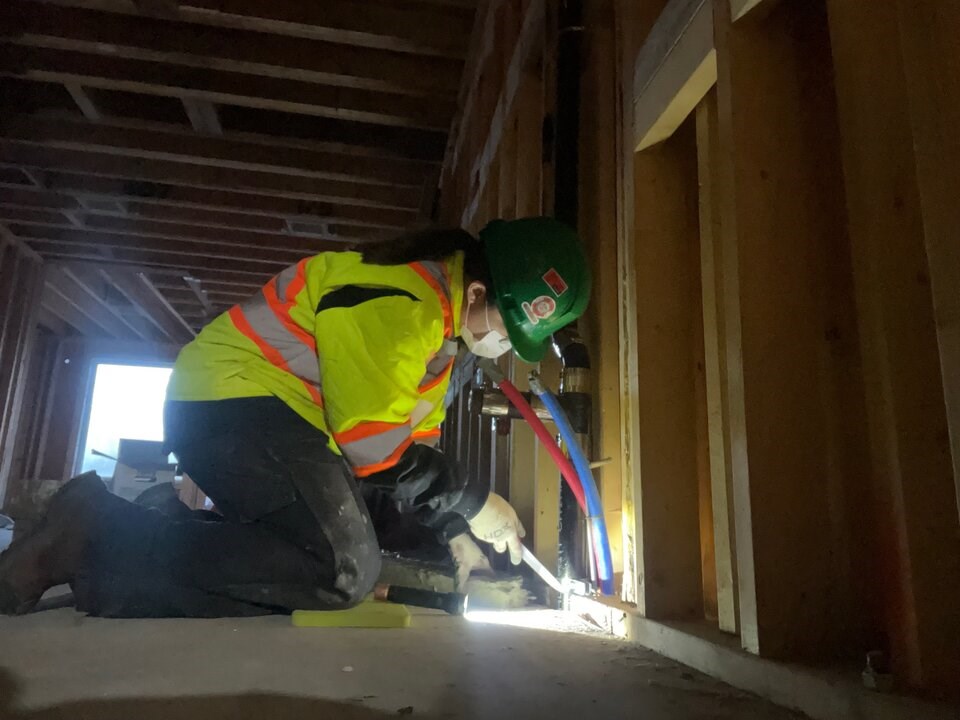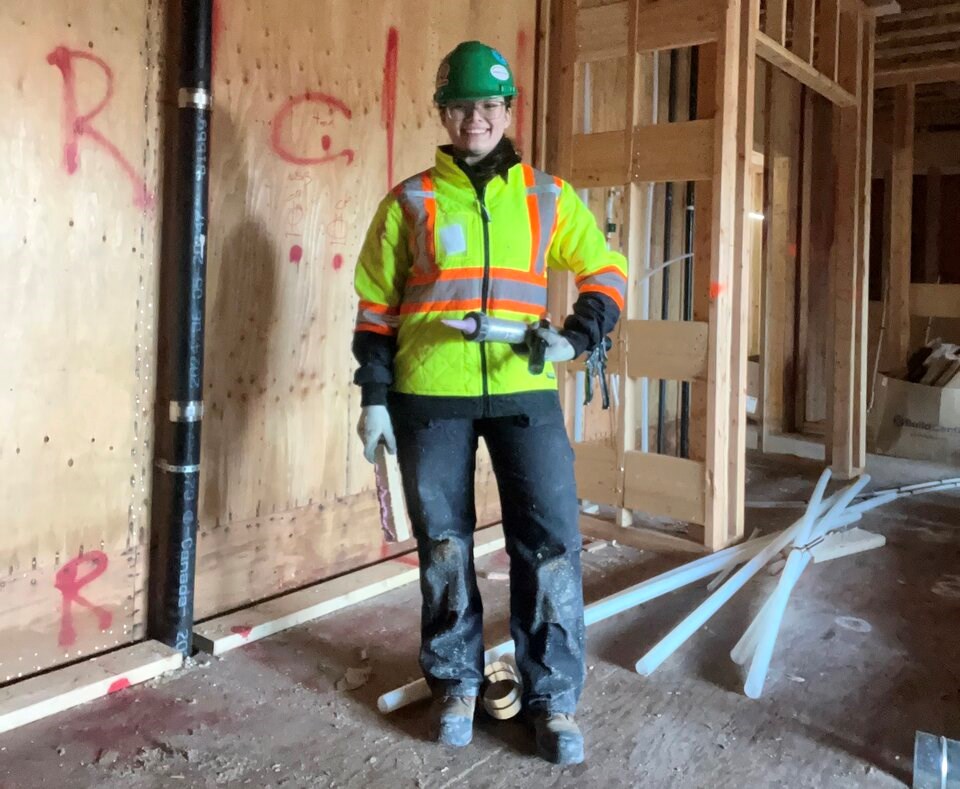Every morning, Ann Ralls wakes up at 5 a.m., and jumps on a bus on her way to one of two new construction sites in 91ԭ��. At 23, the recent graduate had studied geoscience and hoped to land a job unearthing urban streams in a process known as “daylighting.”
But work was hard to come by until she stumbled across an online posting: a local union was looking for candidates to enrol in a pre-apprenticeship program working as a mechanical insulator.
Now in her third week on the job, Ralls has been paired up with an experienced contractor. Each day, she learns the nuances of how to insulate the pipes and machinery that make up a building’s hot water, heating and cooling systems.
“I enjoy it. I enjoy working physically demanding jobs,” said Ralls. “Insulating is climate regulation, really — you’re just working toward conserving energy.”
The young woman is one of eight participants recruited by the Youth Climate Corps of BC (YCCBC) and placed with the BC Insulators Union Local 118 last month.
The B.C. climate corps was created by the Kootenay-based conservation group Wildsight in 2020. Expanding across the province, it has backed over 100 young workers to help install heat pumps and solar panels at a seniors home in Nelson; climate-proof homes in Kamloops; and rejuvenate traditional cultural and land management practices at a First Nation on 91ԭ�� Island.
Each of the positions pays young people between the ages of 17 and 30 a “living wage” as they get training and work experience related to climate action, according to the group.
The idea of building regional and even national climate corps has gained traction in recent years. The modern version of the corps is influenced by the Civilian Conservation Corps of the Great Depression. Between 1933 and 1942, the U.S. program employed about three million workers to expand national parks, plant billions of trees, and build hundreds of thousands of dams and roads.
Advocates of the idea, such as the David Suzuki Foundation-backed group the , have called on the federal government to fund the creation of a pan-91ԭ�� climate corps that would create 20,000 jobs with a $1-billion-a-year investment.
YCCBC says it offers a proof-of-concept that the idea can be scaled across multiple communities that face unique challenges from climate change. Last June, the group received a $3-million boost in funding from the B.C. government to expand their operations across different parts of the province. Part of that money is helping to subsidize the on-the-job training with the insulators' union.
Last month, the program's participants received 20 hours of education, and have since continued their education at different commercial work sites — a path that opens the door to a paid red seal certification in mechanical insulation.
Ben Simoni, executive director of YCCBC, said the latest pilot program offers a hint at what climate corps could be if it had enough government funding.
“We’re paying young people a living wage here. But that funding is going quick,” Simoni said. “For this to be scaled, we certainly need that level of certainty that only the government can provide.”
In the lead up to the latest B.C. election, both the NDP and Greens said they would back the climate corps — the latter with a $50-million promise. Simoni said they have also been in talks with the federal government but that they have yet to reach an agreement.
“What could we do with $50 million per year? We could be running programs across the province,” he said. “We could be retrofitting schools. We could be helping people in high school get college credit. We could be doing mass fire restoration around communities, helping communities with emergency preparedness.”
“Our ambitions are to offer this program to any young person who wants to be part of it. In B.C., that could be thousands of young people a year.”
Simoni says the program is meant to help a generation of young people who feel left behind and face a “bleak future” where climate change is inevitable and the prospect of home ownership is increasingly out of reach.

Rob Sheck, business manager of the BC Insulators Union Local 118, said his union has a mutual interest in helping to fill that void. He said there are a lot of members retiring in recent years. And like many trades, it can be hard to find a new generation of workers to replace their ranks.
“Every single trade is looking for people. We’re all in the same boat,” he said.
For years, many young people were told to pursue success in white-collar jobs, according to Sheck. But today, threats from climate change, the affordability crisis and the spectre that artificial intelligence will eliminate entire workforces could drive more young people toward well-paid skilled trades, he said.
“No matter what, you’re going to need people with hard hats and steel-toed boots going out and building this infrastructure,” he said. “A robot will never replace a mechanical insulator.”
Government funding and the promise of job security aren’t the only things standing in the way of scaling up a climate corps at least partially built on blue-collar jobs.
Ralls said working on construction sites has sparked an interest in the role building planning plays in reducing emissions. She also likes the hands-on, physical work. But she still can’t see herself insulating pipes for the rest of her life.
“I am grateful that I have a job because I know how difficult it is to get jobs at all here,” she said. “But it's not what I studied for. And it's not, I guess, my passion.”


